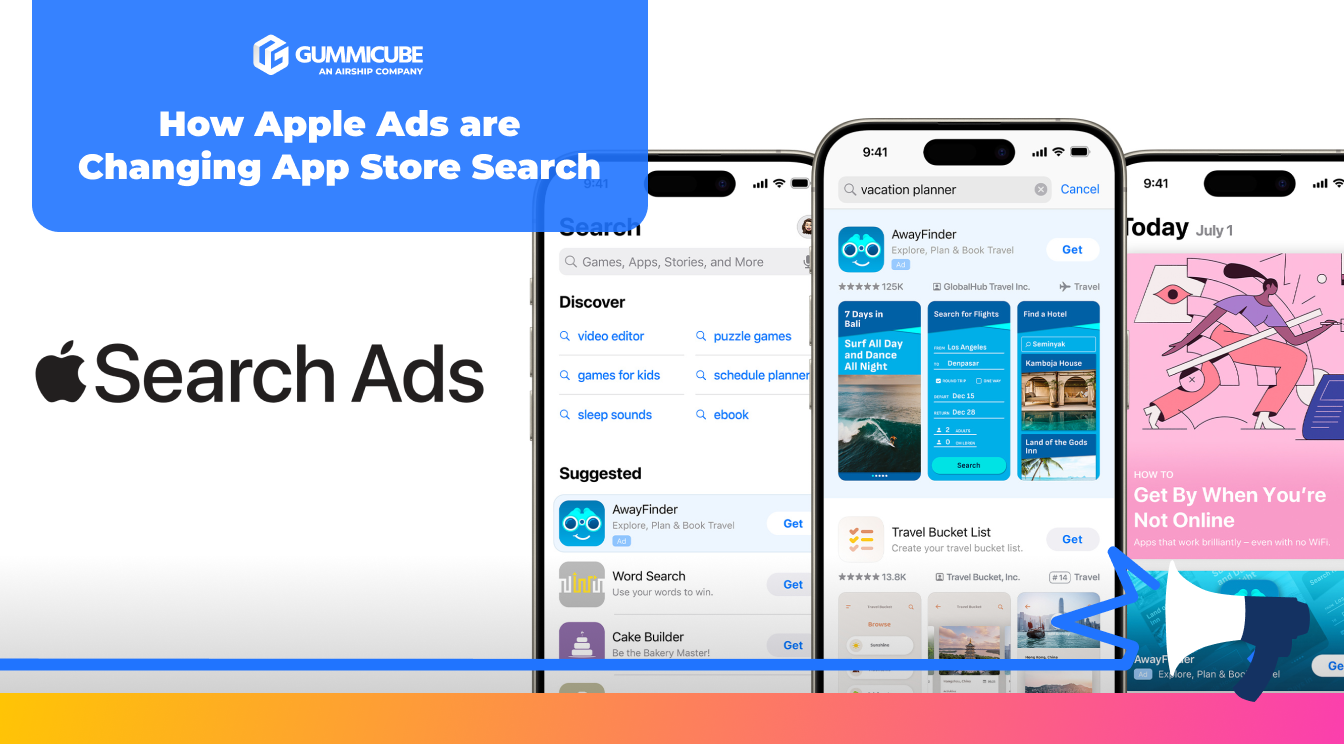
Netflix is Changing Strategies to Elevate User Engagement
Posted on February 5th, 2026
Netflix’s mobile revamp is a strategic acknowledgment that user behavior has shifted toward social-first, vertically consumed, algorithmically surfaced content.

In a move that underscores the importance of ethical compliance within the App Store ecosystem, Apple has officially removed the viral apps Tea Dating Advice and TeaOnHer from the App Store. The decision was based on repeated violations of Apple’s rules surrounding content moderation and user privacy, both of which play an essential role not only in app longevity but also in sustainable App Store Optimization (ASO).
This removal serves as a significant reminder to developers that visibility and downloads are only part of the equation. A well-optimized app must also align with Apple’s evolving standards for user safety and data protection to maintain success in the App Store.
According to statements shared with several media outlets, Apple confirmed that both Tea Dating Advice and TeaOnHer failed to meet its requirements regarding user privacy and moderation. The company cited an excessive number of user complaints and negative reviews, many of which involved the alleged sharing of minors’ personal information. Despite repeated communication from Apple to the developers, these issues were not resolved, ultimately resulting in the removal of both apps from the platform.
The decision came even as both apps were performing exceptionally well from a business standpoint. Tea Dating Advice reportedly generated more than $5 million in gross revenue, while TeaOnHer reached approximately 2.2 million downloads, despite offering no in-app purchases. However, Apple’s choice to delist them reinforces a key principle: app success cannot override compliance. At the time of writing, both apps remain available in the Google Play Store, but Apple has made its position clear.
Apple’s decision to remove these viral dating apps followed an extensive evaluation process and repeated attempts to engage the developers in addressing compliance failures. Reports indicate that the apps became controversial due to their approach to “dating advice” and the handling of user content. Allegations surfaced that personal information was being displayed or shared without consent, prompting user backlash and widespread concern.
Apple’s internal review identified critical deficiencies in how these apps managed user-generated content and personal data. According to the App Store Review Guidelines, all apps featuring user-generated content must include reliable moderation tools. These include options for reporting inappropriate material, active filtering mechanisms, and systems for removing harmful or non-consensual posts. The Tea apps, according to Apple, lacked adequate infrastructure to meet these expectations.
The apps were also found to be noncompliant with Guideline 5.1, which governs privacy and data use. Apple requires that all apps disclose how they collect, store, and share user data, and that such information is accessible both within the app and its App Store listing. Failure to provide these disclosures, or to implement transparent consent mechanisms, constitutes a breach of Apple’s privacy policy.
Despite multiple warnings and opportunities to correct these issues, the developers did not implement the necessary changes. As user complaints increased and negative sentiment spread through app reviews and social media, Apple escalated its enforcement actions. Eventually, both apps were removed from the App Store entirely.
This enforcement decision aligns with Apple’s broader commitment to maintaining trust within its ecosystem. The company continues to prioritize user safety and data protection, even when doing so requires removing popular, high-performing applications.
The case of Tea and TeaOnHer illustrates a critical relationship between compliance and App Store Optimization. Many developers view ASO solely as a marketing or visibility function, focused on driving downloads through improved metadata, creative assets, and keyword strategies. However, compliance is a foundational pillar of ASO. Without meeting Apple’s technical and ethical standards, all other optimization efforts can collapse overnight.
Strong ASO is built on trust. Visibility means little if an app is perceived as unsafe, unethical, or careless with user data. Apps that violate Apple’s privacy and moderation policies risk not only being removed but also permanently losing user confidence. Even if reinstated, rebuilding reputation and ranking momentum is extremely difficult.
For developers, this incident underscores the importance of ASO extending beyond keyword rankings and screenshots. It encompasses the entire user journey, from first impression to long-term trust. Ensuring alignment with App Store rules is therefore a direct investment in both visibility and sustainability.
One of the most striking elements of Apple’s statement was its reference to user complaints and negative reviews as key factors in the decision to remove the Tea apps. This highlights the dual role of app ratings and reviews: they serve both as public feedback and as indicators for Apple’s compliance oversight.
High review volume is not always a positive sign if the sentiment is overwhelmingly negative. When reviews repeatedly cite privacy concerns, inappropriate content, or unsafe experiences, Apple interprets these as red flags indicating deeper issues within the app’s functionality or management.
From an ASO perspective, reputation management must be integrated into every optimization plan. Monitoring user sentiment, responding to complaints, and addressing issues publicly can prevent isolated frustrations from escalating into systemic backlash. A well-managed review response strategy demonstrates accountability, which strengthens both user trust and Apple’s confidence in the app’s integrity.
Sustained negative feedback, if ignored, can damage an app’s ranking, reduce conversion rates, and ultimately lead to policy action. The removal of Tea and TeaOnHer shows how unresolved user dissatisfaction can transform into regulatory enforcement.
Privacy and moderation are now intrinsic to ASO success. Apple’s ecosystem is built on user trust, and any violation of that trust can nullify months of marketing and optimization effort. Developers who prioritize privacy compliance not only safeguard their users but also protect their long-term visibility in the App Store.
Apps that collect user data must clearly and transparently disclose their practices. A clearly written and easily accessible privacy policy is essential. Users should be aware of what information is being collected, how it is stored, and whether it is shared.
Moderation carries similar weight, particularly for social and community-based apps. Apple’s guidelines require that apps provide reliable tools for users to report violations and that developers actively remove inappropriate or unsafe content. Effective moderation protects users while also protecting the app’s standing within Apple’s review framework.
Both of these practices contribute directly to ASO. A secure, well-moderated app will earn more positive reviews, higher retention rates, and stronger overall engagement. Over time, those signals improve organic visibility within the App Store’s ranking algorithms.
Compliance cannot be treated as a post-launch concern. For ASO professionals, it should be embedded into every phase of an app’s lifecycle. Before an app is even submitted for review, developers should confirm that moderation systems, privacy disclosures, and data permissions are fully aligned with Apple’s requirements.
Once live, ongoing optimization efforts should include compliance monitoring. This involves evaluating reviews for potential red flags, tracking emerging issues that may trigger App Store intervention, and ensuring that updates reflect improvements in privacy and security.
App metadata and creative assets should also accurately represent the app’s functionality. Misleading screenshots or exaggerated claims can violate Apple’s advertising standards and erode user trust. Every element of an app listing must reflect the real experience users will encounter after downloading.
When developers adopt this proactive mindset, compliance becomes an integral part of their brand identity rather than a burden. Apps that consistently communicate transparency and safety develop stronger relationships with users, which in turn drives long-term ASO success.
The financial and operational impact of removal from the App Store is substantial. Once an app is delisted, it loses all accumulated keyword rankings, ratings history, and organic momentum. For an app like Tea, which generated millions in revenue and downloads, that represents a complete halt in visibility and growth potential.
Reinstating an app after removal is an arduous process. Developers must not only resolve the underlying issues but also convince Apple that lasting corrective measures have been implemented. Even after reinstatement, it can take months to recover previous rankings and user trust.
The Tea and TeaOnHer removals emphasize that success in the App Store depends on the intersection of performance, transparency, and user protection. Developers should treat privacy and moderation as integral to product design, not as afterthoughts.
Developers should evaluate their optimization strategies through the lens of compliance. A data-driven approach to keyword management or creative testing must also include ongoing assessment of how those efforts align with Apple’s evolving standards.
Above all, developers must maintain open communication with Apple when concerns arise. In most cases, Apple offers developers an opportunity to address guideline violations before removal becomes necessary. Responding promptly and transparently to such feedback demonstrates professionalism and can often prevent escalation.
Apple’s decision to remove Tea and TeaOnHer underscores a simple but powerful truth: compliance is inseparable from visibility. Success in the App Store depends not only on how well an app performs but also on how responsibly it manages its users, content, and data.
Developers who approach ASO with integrity will continue to thrive in Apple’s ecosystem. Those who overlook moderation, ignore privacy feedback, or dismiss user concerns risk seeing their success vanish overnight.
If your team is focused on long-term visibility and wants to ensure your app is fully aligned with Apple’s evolving standards, our ASO services can help you achieve this goal. We specialize in optimizing listings that meet Apple’s strict requirements while creating opportunities for boosting conversion and user trust.
Reach out today to learn how strategic App Store Optimization can strengthen your app’s presence, protect its reputation, and ensure that your growth remains sustainable within the App Store.

Netflix’s mobile revamp is a strategic acknowledgment that user behavior has shifted toward social-first, vertically consumed, algorithmically surfaced content.

Apple’s upcoming Siri update, powered by Google’s Gemini AI model, represents a meaningful inflection point for the App Store ecosystem and ASO strategies.

Apple Ads are changing App Store search by expanding ad placements while simultaneously reinforcing relevance as the core driver of visibility. Read more!